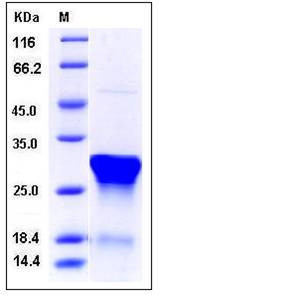Human CNTF Protein (His Tag)
HCNTF
- 100ug (NPP1202) Please inquiry
| Catalog Number | P11841-H07E |
|---|---|
| Organism Species | Human |
| Host | E. coli |
| Synonyms | HCNTF |
| Molecular Weight | The recombinant human CNTF consisting of 214 amino acids and has a calculated molecular mass of 24.5 kDa. The apparent molecular mass of the protein is approximately 27-30 kDa in SDS-PAGE under reducing conditions. |
| predicted N | Met |
| SDS-PAGE |  |
| Purity | > 90 % as determined by SDS-PAGE |
| Protein Construction | A DNA sequence encoding the human CNTF (NP_000605.1) (Ala 2-Met 200) was expressed, with a polyhistide tag at the N-terminus. |
| Bio-activity | 1. Measured by its binding ability in a functional ELISA. Immobilized human His-CNTF (cat:11841-H07E) at 10 μg/ml (100 μl/well) can bind biotinylated rat CNTFR-His (P80019-R08B). The EC50 of biotinylated rat CNTFR-His (P80019-R08B) is 60-140 ng/ml. 2. Measured in a cell proliferation assay using TF-1 human erythroleukemic cells. The ED50 for this effect is typically 1-4 μg/mL. |
| Research Area | Immunology |Inflammation / Inflammatory Mediator |Inflammatory Cytokines & Chemoki and Receptors |IL-6 Family |
| Formulation | Lyophilized from sterile PBS, pH 7.4 1. Normally 5 % - 8 % trehalose and mannitol are added as protectants before lyophilization. Specific concentrations are included in the hardcopy of COA. |
| Background | Ciliary neurotrophic factor (CNTF) is a member of the cytokine family. It is a polypeptide hormone that have functions in promoting neurotransmitter synthesis and neurite outgrowth in certain neuronal populations. It's actions appear to be restricted to the nervous system. Ciliary neurotrophic factor (CNTF) has biological effects through the activation of a multi- subunit receptor complex, consisting of an extracelluar CNTF binding subunit (CNTFα) and two transmembrane signal transduction proteins: glycoprotein gp130 and LIF receptor. CNTF is considered as a potent survival factor of neurons and oligodendrocyteands may be relevant in reducing tissue destruction during inflammatory attacks. CNTF also is a survival factor for neurons of the peripheral sensory sympathetic and ciliary ganglia. It has been reported that CNTF could be an agent that has therapeutic potential and possibly induces differentiation of large multipolar ganglionic phenotype in a subset of progenitors. |
| Reference |
CNTF related areas, pathways, and other information |
